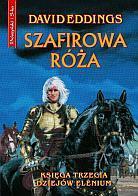What do you think?
Rate this book


544 pages, Paperback
First published January 1, 1991
Here ends The Sapphire Rose, thus concluding the tale of The Elenium -- but not the adventures of Sparhawk and his companions. Watch for further danger and magic in The Tamuli, a new series from David Eddings, forthcoming from Del Rey Books.